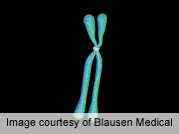(HealthDay)—Ponatinib is active in chronic myeloid leukemia (CML) and Philadelphia chromosome-positive acute lymphoblastic leukemia (Ph-positive ALL), according to a study published online Nov. 1 in the New England Journal of Medicine.
Jorge E. Cortes, M.D., from the University of Texas MD Anderson Cancer Center in Houston, and colleagues conducted a phase 2 trial of ponatinib (45 mg once daily) in 449 heavily pretreated patients with CML or Ph-positive ALL with resistance to or unacceptable side effects from dasatinib or nilotinib, or with the BCR-ABL T315I mutation. Patients were followed for a median of 15 months.
The researchers found that of the 267 patients with chronic-phase CML, 56, 46, and 34 percent, respectively, had a major cytogenetic response, a complete cytogenetic response, and a major molecular response. Responses were durable (estimated rate of sustained major cytogenetic response of at least 12 months, 91 percent) and were seen regardless of the baseline BCR-ABL kinase domain mutation status. Among 83 patients with accelerated-phase CML, 55 and 39 percent, respectively, had a major hematologic and major cytogenetic response, while among the 62 patients with blast phase CML, the response rates were 31 and 23 percent, respectively. The major hematologic and cytogenetic response rates were 41 and 47 percent, respectively, for those with Ph-positive ALL.
"In conclusion, ponatinib showed clinically significant activity in patients with CML and those with Ph-positive ALL," the authors write.
Several authors disclosed financial ties to pharmaceutical companies, including Ariad Pharmaceuticals, which manufactures ponatinib and funded the study.
More information:
Abstract
Full Text
Journal information: New England Journal of Medicine
Copyright © 2013 HealthDay. All rights reserved.


















